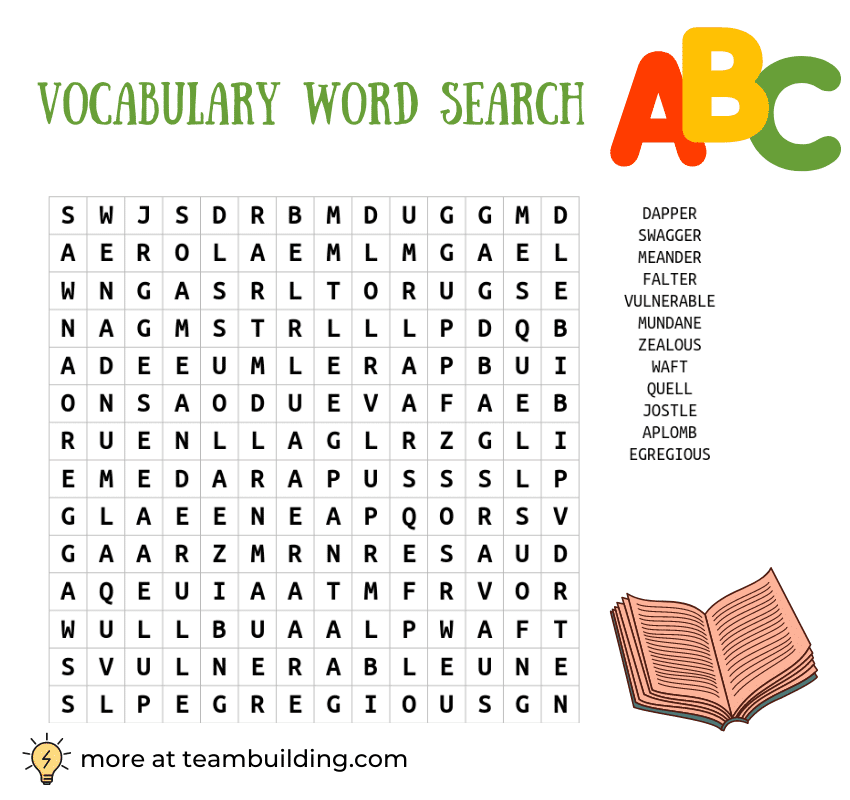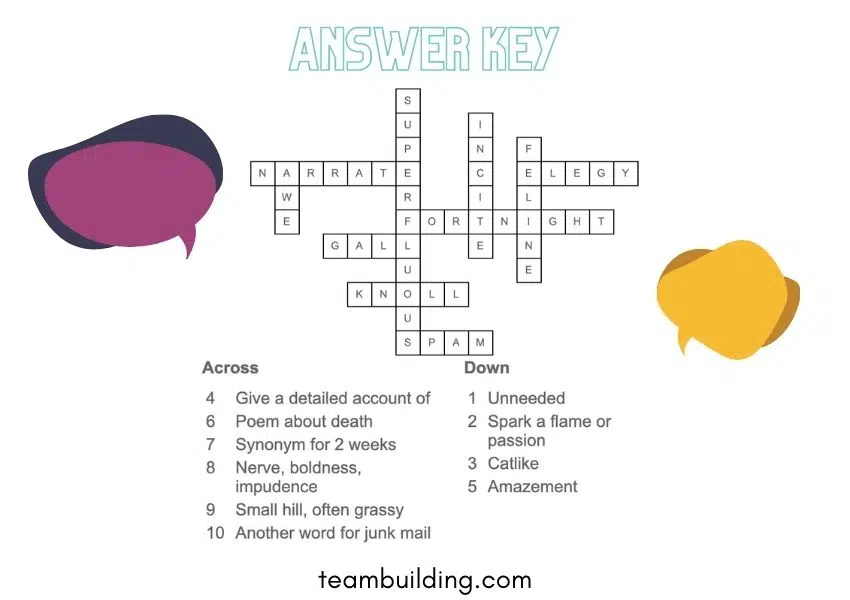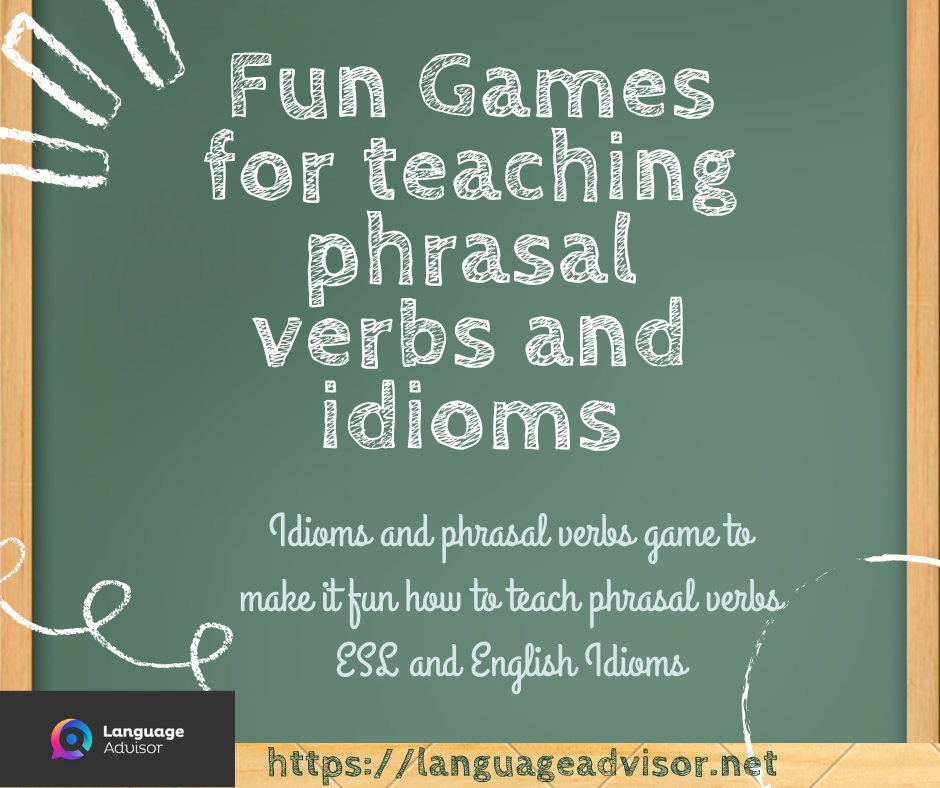You found our list of fun and simple vocabulary games for adults.
Vocabulary games are activities that include language and wordplay. Example games include Word Association and Hang Man. Players can enjoy vocabulary games in person or online. The purpose of these games is to strengthen vocabulary skills. These games are also known as “vocab games”, “letter games” and “vocabulary building games.”
These games make great online classroom activities and communication games, and can be used as online fun activities for employees.
This list includes:
- vocabulary games for adults
- simple vocabulary word games for adults
- fun online vocabulary games and activities
- English vocabulary games
- vocabulary games in English
- games to improve vocabulary
- vocabulary building activities
- vocab review games
- vocabulary games for students
Get ready to play!
List of vocabulary games
From Pictionary to word scrambles to synonym memory, here is a list of fun word games to play in classrooms, at parties, or during meetings.
1. Vocabulary Pictionary
Pictionary is a game of charades where players draw words instead of acting them out.
To play:
- Split the group into teams.
- Each round, assign one team member to draw.
- Give the drawing team member a word.
- Allow up to sixty seconds for teammates to guess.
- If the team guesses correctly, then assign one point.
You can give other teams the opportunity to steal, or move onto the next team’s turn. The game is a great way to practice new vocabulary, as players connect the word with an image. Pictionary is a fun game for virtual parties or in-person affairs.
To play Pictionary online, draw on the whiteboard app feature on your online meeting software.
2. Word Association
Word Association is one of the best vocabulary games for kids and classrooms since playing does not require a large vocabulary. The rules are simple and easy to understand. Typically, the game involves two players.
To play:
- Player one says a word.
- Player two responds with the first word that comes to mind.
- Player one either chooses a new word or responds to player two’s word.
- The game continues until one player repeats a word or pauses too long.
The rapid pace of the game generates excitement and occasionally results in funny answers.
If a student makes a mistake, then the teacher can pause the game and ask the student to explain or find a more fitting word. Ideally, gamemasters should allow players a few extra seconds to respond. Players should never feel embarrassed. There are no wrong answers in word association, but the game can serve as a learning opportunity to find better words.
If playing via Zoom, then player one or the teacher speaks a word, and other students answer in the chat. The class counts up matching answers and discusses different responses, guessing the reasoning behind each answer.
3. Vocabulary Hangman
Hangman is a classic chalkboard word game that translates easily to online play, thanks to digital whiteboards.
To play:
- Assign a player a word.
- The player draws a series of blanks corresponding to the number of letters in the word.
- Other players guess letters.
- If the letter is in the word, then the “executioner” fills in the blank. If not, then the executioner draws one portion of the gallows.
- The game ends when players guess the word, or when the picture is complete.
The best words to use for hangman contain less-used letters like z, x, and q. Examples of hard hangman words include zigzagging, razzmatazz, and quadrants.
4. Word search
Word searches are common classroom vocabulary games. These activities work well for handouts, and you can play during video calls by using the whiteboard feature and enabling annotation.
We made a sample word search you can use.
To make the game more competitive and exciting, turn the challenge into a race and award prizes to the first players to complete the puzzles.
5. Crossword
Crossword puzzles consist of a series of interconnecting boxes, each of which starts blank but contains one letter by the end of the game. Under the puzzle are two lists of clues, across and down respectively. Solvers need to consider the meaning of words, number of letters, and surrounding words, making the game strategic as well as literary.
Here is an example of a crossword puzzle you can use with your class or team.
Here is the answer key.
Crosswords are great word games for any age or skill level because puzzle makers can adjust the difficulty to suit players. To make your own crossword puzzle, use an online crossword creator.
6. Word Scramble
Word scrambles make great games for English class, and adults enjoy these language brain teasers as well. Simply mix up the order of the letters and ask players to unscramble and identify the original words.
Here is a sample to start with.
And here is the answer key.
To make your own word scrambles, use an online letter randomizer.
7. Scrabble
Scrabble is one of the most popular word games for adults or children. Players must use letter tiles to assemble words on the game board.
To play:
- Each player draws seven letter tiles.
- During turns, players can play tiles or exchange them for new letters.
- Players build words on the board, with each new word connecting to an existing word.
- Tiles have a point value assigned depending on the challenge of the letter. When a player makes a word, tally the letter and add the score to the point board.
More challenging letters have higher point values. For example, E is one point, while Z is ten. To find the point values for each tile and read more gameplay tips, check out this guide from Hasbro.
To coordinate the game for language lessons, assign higher scores for vocabulary words, and ask players to use the words in a sentence for extra points.
Scrabble is easy to play online, too, making it one of the best online vocabulary games. To play virtually, simply find a multiplayer online version of the game, such as Words With Friends.
8. Scattergories
Scattergories is one of the most fun and simple word games for adults. The game challenges players to think up words all starting with the same letter.
To play:
- One player rolls a letter die or uses a letter generator to pick the first letter.
- The timekeeper puts 60 seconds on the clock.
- Players write down one answer per category starting with the letter.
- When time runs out, players read the answers.
- Players receive a point for every answer.
Alliterative phrases count for double or triple points. If two players have the same answer, then they must cross it out and neither receives points. Of course, a player will not receive points for blank answers either. At the end of each round, the player with the most points wins.
Here is a list of sample Scattergories categories:
- A boy’s name, girl’s name, or gender neutral name
- Capital cities
- Four letter words
- Types of drinks
- Holidays
- Careers or professions
- Cartoon characters
- Websites
- Desserts
You could create more inventive categories for the game, or challenge players to make up prompts.
To play virtually, use the chat, screen-share, whiteboard functions in your virtual meeting platform. You can also share a Google Doc or Form, or join a multiplayer online Scattergories game together.
9. Tree or Bob Ross
Tree or Bob Ross is a fun video conference game that challenges players to guess a word by asking questions.
The player who conjures the word is The Post. The Post answers This or That questions whose answers help players narrow down the word.
The first question of the game is usually “is it more like a tree, or more like Bob Ross?” and The Post must answer accordingly. For instance, a rose is probably more like a tree, but Pinnochio presents an interesting challenge.
Each turn, the guesser adds a new word. For example, the second question might be, “is it more like a tree or a fern?” The game continues until players guess correctly. For more excitement, introduce a time limit, or award more points if players guess the word during earlier rounds.
10. Vocabulary Pyramid
Pyramid challenges players to guess words from context clues. The pyramid is a collection of six words, arranged with three on the bottom, two in the middle, and one at the top. To win, teams must guess all words within the pyramid in the allotted time.
To play:
- Divide the group into teams.
- Give one player on each team the pyramid.
- The pyramid holder must give hints to teammates describing each word without using the actual name of the item.
- When players guess correctly, the pyramid master can move to the next word. Or, players can say “pass,” and return to the word later.
- Teams receive a point for every correct guess.
When determining the time limit, consider the age of your players and the difficulty of the words. In general, 30 seconds per word, or three minutes total, is a good place to start, but add or take away time to increase or decrease the challenge.
11. Invisible Bridge
Invisible Bridge is similar to six degrees of Kevin Bacon. In both games, you must figure out a way to connect two seemingly distant concepts. Six degrees of Kevin Bacon uses actors, while Invisible Bridge uses words.
To play:
- A player suggests two unrelated words.
- Player one gives a number of planks. This is how many steps other players must use to relate the two words.
- The other players think up words that share similar traits, synonyms, or connector words to move from one term to another.
An example round might look as follows:
Tiger, Astronaut, eight planks
Tiger – Balm – Lip – Service – Customer – Happy – Pills – Capsules – Space – Astronaut
Meanwhile, Tiger, Astronaut, two planks might look like this:
Tiger – meat eater – meteor – Astronaut
One fun aspect about this game is there can be more than one correct answer, and opposing teams can dispute far-reaches. Invisible bridge encourages players to think about the nature of language and the relationship between words.
12. Poetry Improv
Poetry Improv is an exercise that challenges participants to craft verses on the spot.
To play:
- Pick a poetry style, such as sonnet, haiku, acrostic, limerick, or free verse.
- Give participants vocabulary words to use within the poem.
- Allow five or ten minutes for groups or individuals to complete the verses. If playing online via meeting software, then send groups to breakout rooms to work.
- Ask poets to share the masterpieces aloud.
For extra fun, turn other players into judges by asking them to rate the poems by holding up scorecards. To make the game more fast-paced, ask players to finish each others’ phrases on the spot for a true poetic improv.
13. Synonym Memory
The rules of Memory are easy: flip over two cards at a time and look for matching pictures or words. When players find pairs, they take the cards off the board. The player with the most pairs of cards at the end of the game wins.
Synonym Memory puts a challenging spin on the simple game. Instead of hunting for exact matches, players pair up words with synonyms.
Here are some sample matches:
- enticing/tempting
- assume/suppose
- patience/restraint
- revoke/rescind
- impact/collision
The game encourages players to think in different ways, as participants will need to remember the location of the cards as well as consider meanings of words.
To play online, make your own virtual synonym memory game with an online tool and share screens to play, with one player flipping over the cards at other players’ request.
List of words to use for vocabulary games
Here is a list of great words to use in word games:
- serendipity
- fortitude
- akimbo
- sumptuous
- ineffable
- zephyr
- incorrigible
- medallion
- mauve
- bombast
- denouement
- contemporary
- gossamer
- inane
- hippodrome
- concession
- ideology
- quintessential
- prescient
- regurgitate
- gnash
- cataclysmic
- knell
For further inspiration, use a random word generator or consult online lists of difficult or intersecting words.
Conclusion
Vocabulary games and activities test and strengthen players’ communication skills. These word games minimize frustration by disguising language lessons in the form of an exciting challenge. Not to mention, simple word games are fun for adults and kids alike, and make great icebreaker activities during meetings. Most games only require words and a way to share them, so playing word games online via Zoom or similar platforms is easy.
For even more smart fun, check out our posts on problem solving games, question games and team building brain teasers.
FAQ: Vocabulary Games
Here are answers to common questions about vocabulary games and activities.
What are vocabulary games?
Vocabulary games are word and language games you can play with students, coworkers, or family and friends. These games challenge players to hunt for words or definitions, brainstorm terms, deduce phrases based on clues, or create words under certain conditions. Language games are a great way to teach new vocabulary and help students practice recognizing and using new words. These activities are also known as “vocabulary building games” and “vocab games”, and are similar to “word games” and “letter games”.
What are some fun word games for groups?
Some fun word games for groups include Pictionary, Tree or Bob Ross, and word scrambles.
What are some online vocabulary games?
By using virtual meeting software like Zoom, you can play any word game online. Some good virtual vocabulary games include Scrabble, Scattergories, and online crossword puzzles.
What are good ESL word games?
The best ESL word games are easy to understand and play yet expand the vocabularies of participants. Good ESL word games include word association, word searches, and hangman.
What are fun ways to teach vocabulary?
Word games are one of the most fun and easy ways to teach vocabulary. While some kids get frustrated with straightforward reading or language exercises, word games disguise vocabulary lessons as a fun challenge. Plus, playing language games together is a great teamwork exercise.
10000+ результатов для ‘phrasal verb games get’
Phrasal verb ‘go’
Викторина
от Arisha2103
teenagers
English
phrasal verb go
Phrasal verb «bring»
Пропущенное слово
от Arisha2103
teenagers
English
Phrasal verb bring
Phrasal verb GET
Случайные карты
от Allaazubareva
Expert first
Get
phrasal verbs
Phrasal verb ‘TO RUN’
Сопоставить
от Nataliyawinter2
phrasal verb
Phrasal Verb: GET
Викторина
от Natalyaleonidovna
CityStars10
phrasal verb
phrasal verb GET 8
Сопоставить
от S1412s32
Spotlight 8
Get / Phrasal verbs
Викторина
от Irishja84
oxford discover 3
get phrasal verbs
phrasal verbs
Phrasal verb get
Сопоставить
от Olesija19821711
Phrasal verb «to get»
Сопоставить
от Asternika
Phrasal verb «get». English file Advanced 3A
Случайные карты
от Katerinatrizna
Advanced
English file advanced
phrasal verbs
Phrasal Verb: Come
Викторина
от Natalyaleonidovna
CityStars10
phrasal verb
Phrasal Verb: Get
Викторина
от Antkatya8
Unit 3 step 8 cut
Викторина
от Polunochnik
phrasal verb
Rainbow 10
Get phrasal verb
Пропущенное слово
от Malibr18
phrasal verb «get»
Викторина
от Valeria436
Phrasal Verbs Make and Take
Викторина
от Antkatya8
English
Rainbow 7
Phrasal Verb Make
Phrasal Verb Take
Spotlight 7
Spotlight 8
Spotlight 9
Phrasal Verb To Get
Сопоставить
от Rina2401
phrasal verb ‘get’
Викторина
от Zharovair
get phrasal verb
Сопоставить
от Engteachers
translation- phrasal verb GET
Викторина
от Elenafaibusovic
English
get phrasal verb
Перевернуть плитки
от Rebecca2848
Phrasal verb ‘get’
Совпадающие пары
от Workuskova
Phrasal verb get
Пропущенное слово
от Irinabocharniko
Phrasal verb GET 3
Викторина
от Mariannaa1999
Phrasal Verb. get.
Найди пару
от Kaira2
Phrasal verb get
Сопоставить
от Arisha2103
teenagers
English
Phrasal verb GET
Сопоставить
от Ekadobrocz
Phrasal verb GET 4
Сопоставить
от Mariannaa1999
Phrasal Verb GET
Сопоставить
от Kataevav6
Phrasal verb get
Сопоставить
от Lara210678
7-й класс
Средняя школа
English
phrasal verb GET
Сопоставить
от Mandarinschool
Phrasal Verb: Get
Викторина
от Mashaskor
English
Phrasal verb GET
Сопоставить
от Jul28
phrasal verb get
Выиграй или проиграй викторину
от Katee1036
phrasal verb GET
Сопоставить
от Kateryabichenko
Phrasal verb «get». Advanced
Случайные карты
от Oborisova
phrasal verb ‘give’
Викторина
от Zharovair
phrasal verbs
phrasal verb get spotlight
Сопоставить
от Vassilenko
Spotlight 8
Eyes open 2 Expressions with Get
Случайное колесо
от Zhavoronka
9-14
6 класс
phrasal verb
Eyes Open 2
Copy of Phrasal verb GET
Случайные карты
от Mariya88
phrasal verb GET for Elementary
Откройте поле
от Ek604402
Phrasal verb TO BE
Викторина
от Dementeva1
7-й класс
8 класс
9-й класс
10-й класс
11 класс
English
phrasal verbs
Phrasal verb TO BACK
Викторина
от Dementeva1
6 класс
7-й класс
8 класс
9-й класс
10-й класс
11 класс
English
phrasal verbs
Speaking activity with the phrasal verb GET
Случайное колесо
от Alenabogdanova
Phrasal verb «get». English file Advanced 3A
Случайные карты
от Evaholm28
Upstream B1. 1B. Phrasal verb GET
Викторина
от Philippova
Speaking activity with the phrasal verb GET
Случайное колесо
от Anastasiya28
Adults
English
Upstream B1. 1B. Phrasal verb GET
Сопоставить
от Philippova
Speaking activity with the phrasal verb GET
Случайное колесо
от Bestteachersiie
Phrases with GET
Откройте поле
от Janedvortsova
Adults
English
phrasal verbs
phrases with get
pre-intermediate
Optimise B1 Phrasal Verbs p.33
Флэш-карты
от Zhavoronka
9-14
phrasal verb
Optimise B1
Eyes open 2 U6 Phrasal verbs
Случайное колесо
от Zhavoronka
9-14
phrasal verb
Eyes Open 2
Eyes Open 2 Unit 5 Technology Verbs+Prepositions
Откройте поле
от Zhavoronka
9-14
phrasal verb
Technology
Eyes Open 2
Phrasal verb TO BE (practice)
Пропущенное слово
от Dementeva1
7-й класс
8 класс
9-й класс
10-й класс
11 класс
English
phrasal verbs
Phrasal verbs with «Look» and forms of be/get used to
Пропущенное слово
от Katevesnina
get used to
phrasal verbs with look
Английский
Phrasal Verbs (get)
Сопоставить
от Margaritaten
Phrasal Verb Call and Dependent Prepositions
Викторина
от Antkatya8
Phrasal Verb Call
Spotlight 10
Spotlight 11
Spotlight 8
Spotlight 9
подготовка к ЕГЭ
Phrasal Verb SET. Dependent Prepositions
Викторина
от Antkatya8
Phrasal Verb Set
Spotlight 10
Spotlight 11
Spotlight 8
Spotlight 9
подготовка к ЕГЭ
Phrasal Verb PUT
Викторина
от Antkatya8
Phrasal Verb Put
Spotlight 10
Spotlight 11
Spotlight 8
Spotlight 9
подготовка к ЕГЭ
7th grade. Phrasal verb TO GET. Unit 2, ex. 38
Привести в порядок
от Shev089r
The acquisition of new vocabulary is essential in terms of overall language advancement. However, there is always a need to review active words from time to time in order to use them fluently in speech. Here, we will present a couple of great vocabulary revision games which will perk up every classroom. Through these games the learners will feel how fun, entertaining and effective the learning process can be.
1. Charades
Charades is a fun and cool revision game. Students need to practice their acting skills to explain the words. This game is extremely easy to organize with minimal advance preparation. The only thing to be ready for is to keep a collection of vocabulary cards for the words you have studied.
The class is divided into two teams. Each team member takes turns acting out one of the words from the vocabulary set and explains it by acting out the word. If his or her own team can’t guess the word, the opposite team gets the chance to guess it. Each right answer equals one point.
Skyeng ищет преподавателей английского. Подробности по ссылке: Skyeng
2. Pictionary
Pictionary is also an entertaining game to play for vocabulary review. The rules are similar to those of charades except that instead of acting out the word, it is drawn on the board.
3. Bingo
Bingo can serve as a good revision game. From my experience, most of the groups/students like playing bingo because it gives them the chance to reflect on the words they have digested.
Students are given a blank bingo board and are asked to put the review words into the squares randomly. The teacher puts the active words in a hat or a box, takes them out one by one and defines them. If the student has a word corresponding to the definition, he crosses it out on his bingo board. When someone gets five squares in a row, they should shout, “Bingo!”
Check these articles out as well:
4. A memory style
A memory style card game can be another effective way for reviewing vocabulary. It requires some preparation before the game starts. For each word to be reviewed, one card should have the target vocabulary word and another card should have the definition of the word. You also need to have a big playing grid where you put the words and their definitions face down.
Each person turns over two cards each turn trying to find a match. If the cards do not match, he turns them over again and the next person tries to find a match. If he succeeds, he keeps the cards and gets an additional turn. The player with the highest number of cards at the end of the game wins.
The game can be modified even further. If you have accumulated enough synonyms or antonyms to the target vocabulary, you can practice matching target words to their antonyms or synonyms.
5. Categories
Categories is another awesome revision game which will make students energized and empowered. What they need for the game is to draw 4-6 columns on their paper and write a category at the top of each column. Categories fit the topics covered during the course. For example, if you have covered the business topics of Marketing, Work and Leisure, Ethics, Human Resources, Travel, you write these topics as categories.
You time the students and ask them to write as many words as possible under each category. As a further modification, choose a random letter and write it on the board. Give students enough time to write down a word for each category that starts with that letter.
Экономьте время на подготовку к урокам и проверку домашних заданий со Skyeng. Удаленный формат занятий, защита от внезапных отмен и график, который настроен специально под вас. Присоединяйтесь к нашей команде. Подробности по ссылке: Skyeng
6. Letter scramble
Letter scramble will make students really competitive and super fast. What you need is to take a list of words that your students have recently learned and write a scrambled version of each on the board. Students need to unscramble the words on their paper. The first one to finish deciphering all the words wins.
7. Stop the bus
Stop the bus is a cool game my students adore. I usually divide the class into 2-3 teams. One student from each team. This student sits on a chair facing his peers. Then from behind the student in the hot seat, show the other students a word from the lesson. The other students must try to describe what the word is without saying the actual word. And the student in the hot seat must guess.
The student who guesses the word shouts out “stop the bus” and checks the word with the teacher. If correct, the team gets a point. If wrong, other teams have the chance to guess the word by writing their versions on a piece of paper and passing the papers to the teacher.
8. Puzzles
Puzzles is another cool and easy tool to review the material in an effective way. What I like about this way of vocabulary revision is that students can work in pairs or groups while trying to find words matching the definition in the crosswords. They learn by listening to each other, cooperating to find the right answer. In this way, they both review the material and improve their teamwork skills.
Follow this link to get templates of different types of puzzles.
We also recommend watching a video with Alexei Konobeev. The speaker shared games to help your students remember new vocabulary. These games do not require special training and you can adapt them to any age and level.
We hope that all these games would serve their best to liven your vocabulary revision sessions and make them more meaningful and effective.
Which of these games have you tried? Which ones have you picked up for your next revision slot?

By
Last updated:
February 21, 2021
Brain Candy: 5 Superb Games for Teaching Phrasal Verbs
Do away with boring exercises.
Throw out that dull worksheet.
It’s time to figure out a more amusing way to approach phrasal verbs!
Phrasal verbs can be a tough element of ESL to approach with your class. Your students have just learned the definitions of certain words… and now they have to learn all new definitions that seem to be completely arbitrary!
But once you break out these phrasal verb games, you’ll see that learning phrasal verbs can be a whole lot of fun.
But first things first: Let’s refresh what a phrasal verb is, exactly, and how you might explain them to your students.
Download:
This blog post is available as a convenient and portable PDF that you
can take anywhere.
Click here to get a copy. (Download)
Introducing Phrasal Verbs to Your Class
Simply put, a phrasal verb is a verb whose meaning changes when it’s accompanied by a preposition or an adverb. You can find a more in-depth explanation of what a phrasal verb is here, which is perfect for helping explain it to first-time learners, and here’s an extensive list of different phrasal verbs.
Plus, if you are searching for a basic breakdown of phrasal verbs (with famous movie scenes) to show your students, show them the video below! The lesson is from the FluentU English YouTube channel, which is a goldmine for both students and teachers alike!
If you love teaching with native materials and are looking for a resource to get your students excited about their English, then be sure to subscribe to the channel for more great content.
You’ve been seeing phrasal verbs for years, so the first time you introduce them to a beginner, you may be surprised at how large and difficult it is to intuit the difference between the verb to bring and the phrasal verb to bring up, for example.
Prepositions are some of the hardest words to intuit for foreign language learners, so when a preposition changes the meaning of an already familiar verb, it can seem like public enemy number one as far as your students are concerned. Luckily, you have the power to change that.
Why Implement Games for Teaching Phrasal Verbs
This innate difficulty is one of the reasons we love using games to teach phrasal verbs. Like with prepositions, the best way to learn phrasal verbs is to use them again and again, and this repetition is automatic when playing games. Students have to seek out the verb again and again, committing its new meaning to memory.
Another reason games are one of the ideal ways to teach phrasal verbs is because this is simple memorization. Students may find that some logic is involved in getting from the standard form to the phrasal verb form, but for the most part, these distinctions will not be automatic for learners. Using a game to help memorize these differences is one of the best ways to integrate phrasal verbs into a learner’s lexicon.
In other words, as opposed to with other ESL games, phrasal verb games can be a means in and of themselves of memorizing these terms. Whereas with other grammar themes, games should be a reward at the end of the learning process, phrasal verb games can be an important initial teaching tool.
Feel free to introduce these phrasal verb games as early in the learning process as the first or second day of teaching. This will make phrasal verbs a fun topic to learn instead of a chore!
Another top way to introduce phrasal verbs to your students is with in-context native content from FluentU.
FluentU takes authentic videos—like music videos, movie trailers, news and inspiring talks—and turns them into personalized language lessons.
Hearing (and seeing) native situations when phrasal verbs are used is super beneficial for your students. Be sure to request a free trial of the FluentU program and explore all the other incredible ways FluentU can assist with tricky English components.
1. Phrasal Verb Boggle: For a Quick and Easy Class Intro
This activity is a great intro activity for the second or third day of learning phrasal verbs. Before your students arrive, create a boggle board on your chalkboard or whiteboard, with an assortment of letters. You’ll want to use quite a few letters, at least a 7×7 square.
When your students arrive, give them one minute to write down as many phrasal verbs as they can find in the assortment of letters. You can decide what rules work well for your class’s level and how much time you have.
For example, when you’re just starting out, you may ask students to find words that are already within the Boggle board, where the letters line up into the word, as with traditional Boggle. As students become more advanced, however, this can be used like a word scramble, with students being allowed to use the letters in any pattern or order they like.
When creating the board, always place the letters of the words and phrases you hope your students to find first. Then fill in the surrounding areas with assorted other letters. This can also be varied depending on your students’ level. As students become more advanced, use frequent English letters like “m,” “n,” “s” and “t,” which will throw them off. For beginners, use instead more infrequent letters, like “x” and “z,” so that they have less of a chance of using the wrong letters.
To gain the most from this activity, be sure to check everyone’s work. First, ask your students how many words they found by asking for a show of hands (i.e. “How many of you found one word? How many found two words? etc.)
The last student with their hand up (so the person with the most words) gets to come up and write them on the board. You can then correct as needed, with help from other students. After the original list is corrected, invite any students who have suggestions that are not on the list to come up and add them.
This game is great for remembering the different pairings of preposition and verb, but because it doesn’t reinforce the meaning of the words, you should not rely solely on this game for teaching phrasal verbs.
2. Catapult: For the Digital Classroom
If you have iPads in your classroom or use the computer as part of your teaching style, then this online game, Catapult, is a great tool for teaching phrasal verbs. The game is ideally used as a friendly competition-style game, but it can also be played by just one person or team.
The game works as follows: A sentence is presented with a missing portion of a phrasal verb. Students must read the sentence and choose from three options to fill in the blank. The graphics place the team in two towers, and their phrasal verb skills will help them catapult the other team out of its tower.
We like this game because it’s simple to understand and play, making it perfect for short periods of time. This game is great if you have five or ten minutes left over at the end of class and need a time-filler. Just split your class into two teams, and have them line up down the center of the classroom. Give each classroom a sign or baton to use as a “buzzer,” and have two students face off for every question.
It’s also great for quicker students in the classroom; put students who have finished any in-class work in pairs and allow them to quietly play a round of this game while other students finish their work.
3. Charades: To Wake Your Students Up
Getting students up and moving in the classroom is a great way to keep them focused. Charades is a game that most students already know, so it’s easy to use for teaching phrasal verbs.
Write some of the more physical phrasal verbs on slips of paper and fold them up, placing them into a hat or bowl. Students can draw the phrasal verb and must act it out without using any words or sign language.
Decide whether hand-raising or calling out is better for this game, based on your classroom and students. Either way, the person who guesses the phrasal verb correctly gets to go next!
4. Taboo: For When Charades Gets Old
You can only play charades so many times! Taboo is another option that not only allows you to change it up a little bit, but also affords the student an on-the-spot opportunity to speak a bit too.
Taboo is a card game that you can easily recreate in the classroom. You can either use folded pieces of paper, as in charades, or you can make your own laminated cards to reuse time and time again.
The idea of Taboo is that you must describe a word (in this case, phrasal verb), without using the words on the card. Here’s an example:
For “grow up,” a student could say, “This means when children are getting older.” The student can keep talking and giving more clues until another student finds the right answer, but they cannot use the word “grow” or “up.”
For more advanced learners, you can make the game more challenging by adding a few extra “taboo” words to each card, such as “age,” “older” and “children” for the “grow up” card.
They’ll have to be more creative in their descriptions, and might give a clue such as, “When you are born, you are small, but you do this and become an adult.”
5. Phrasal Verb Matching: For Homework or Pair Work
If you need a short activity to occupy some of your quicker learners, or want to give students some work to do at home, phrasal verb matching is a great game to play.
In order to play phrasal verb matching, you will need to create a series of matching cards with the phrasal verb on one card and the definition on the other. Your interpretation of definition can vary; here are a few fun ideas:
- Use an English synonym or approximate synonym of the phrasal verb
- Use a true dictionary definition of the verb
- Use a drawing or image of the phrasal verb (many are physical, so this is fairly easy to do!)
Hand out the cards and allow students to play a matching game in pairs, placing all the cards face down in front of them and trying to find the matching pairs. This can also be used as a solitary activity when timed, for homework or individual work in the classroom.
Games are a great way to reinforce learning phrasal verbs, but the fun doesn’t stop here! Be sure to back up your games with great writing exercises to keep students using the words they learn, and keep them talking in class so that they can keep up with the curve!
Download:
This blog post is available as a convenient and portable PDF that you
can take anywhere.
Click here to get a copy. (Download)
Fun Games for teaching phrasal verbs and idioms. Idioms and phrasal verbs game to make it fun how to teach phrasal verbs ESL and English Idioms
Fun Games for teaching phrasal verbs and idioms
Idioms and phrasal verbs game to make it fun how to teach phrasal verbs ESL and English Idioms.
Phrasal verbs and idioms can be tough elements of ESL to approach, but once you break out these idioms and phrasal verb games, you’ll see that learning phrasal verbs and idioms can be a whole lot of fun.
The aim of these game is to help students learn and practice a set of phrasal verbs and idioms in an easy and engaging way.
Learning another language is not only learning different words for the same things, but learning another way to think about things
~
Flora Lewis
Fun Games for teaching phrasal verbs and idioms
Idioms and phrasal verbs game to make it fun how to teach phrasal verbs ESL and English Idioms
These activities can all be adapted and used at different points of your lesson.
Phrasal Verbs Game
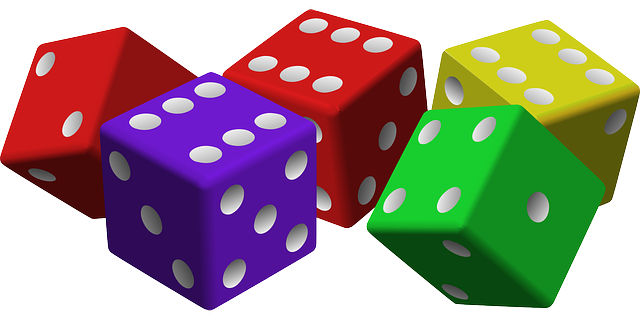
PHRASAL VERBS DICING
For this game you will need a dice and a dictionary (or list) of phrasal verbs with examples for each six students.
Procedure
Write six verbs (e.g. GO,COME,GET,TAKE,PUT,GIVE) and six advebial particles (e.g.OFF,AWAY,OUT,UP,BACK, OVER) in two separate columns on the board and number the items in each column from 1 to 6. If you use different verbs or particles, make sure that all 36 combinations give at least one meaningful phrasal verb (the students may not necessarily have met every combination before.) Each team takes it in turns to throw the dice – twice.
This will produce random phrasal verbs (e.g. 2+1 in the above list gives COME+OFF).The team then has time to produce an unambiguous explanation of the phrasal verb (e.g. the wheel of the car came off because the nuts were loose).
The other team may challenge it and provide a correct version. The teacher is the final arbiter of any disputes.
PHRASAL VERBS BOGGLE

Create a boggle board on your board, with an assortment of letters.
Give your students one minute to write down as many phrasal verbs as they can find in the assortment of letters. You can decide what rules work well for your class’s level and how much time you have. Correct all together in class.
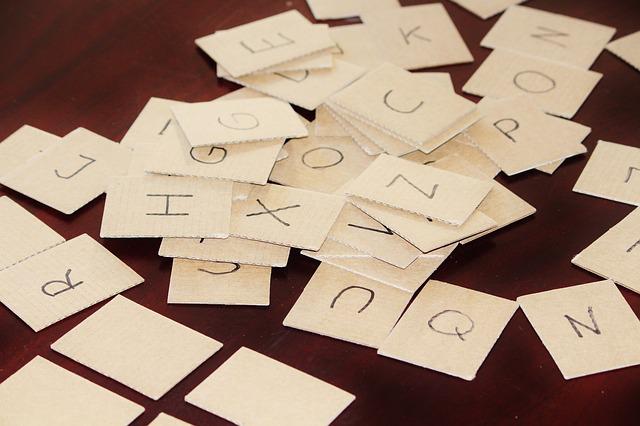
CONCENTRATION MEMORY GAME
Write down phrasal verbs on cards, breaking them up into verb + preposition or adverb. Then, cut them out and make one set for each group of 4.
The students lay the cards facedown on the table and it’s basically a memory game where they have to make a phrasal verb. Once they find a match, they have to make a sentence with it in order to keep the cards and get the point.

PHRASAL VERBS CHARADE
One fun way to way to review these vocabulary items is to play charades: students have to act out a phrasal verb and their team mates have to guess what they’re doing.

FINISH THE PHRASE
Divide the class into teams and invite one student of each team to join you at the front of the classroom. Tell them a verb and give them 10 seconds to write down as many phrasal verbs as they can on the board.
Reward one point for each correct phrasal verb.
Common English Idioms Activities and Games

GUESSING GAME
Write three or four idioms on the board that all touch on one theme (e.g. animals, body parts). Have students work in groups to see if they can guess the meaning of the idioms. Walk around your classroom and check their answers awarding points for any correct definition. Then share the meanings of the idioms with your class and give them an example in context. Move on to another group of idioms around a second theme. Repeat the activity. The first team to reach ten points wins the game.

IDIOMS WARMER
On the board, write 3 idioms which are united by one key-word. For instance all idioms which include the word “head” (bang a head against a brick wall, head in the clouds…).
Then discuss the idioms and their meanings with the students and give them some time to compose their own stories and situations with one of the idioms.
DISCUSS AN IDIOM
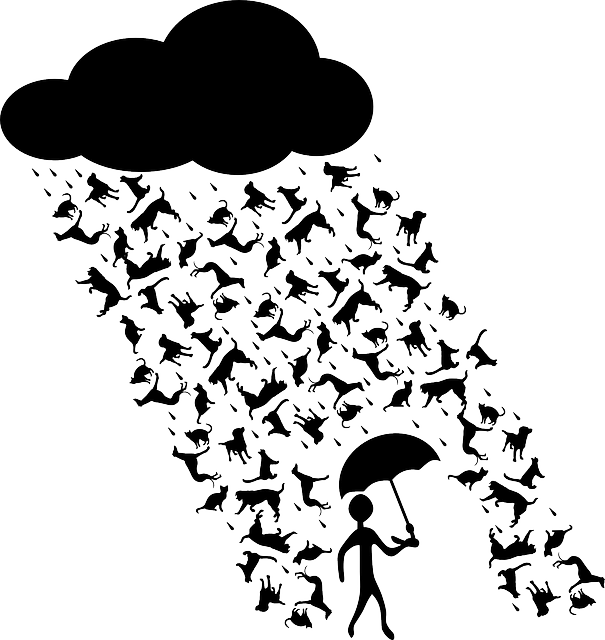
A good end-of-class filler is to further discuss an idiom that came up that day: its meaning and origin. For example, an idiom that might come up in class is “under the table,” to discuss business that is not legitimate: e.g., to hire someone “under the table,” or off the record. This can lead into further discussion of cultural values and practices and more broadly, the gap between what we do and say we do that exists in to a degree in all cultures. Students can bring their own ideas about how much is “under the table” in their home as opposed to adopted countries.
Students appreciate being introduced to common idioms and the window they provide into culture.

CLASS IDIOMS
Keep a running list of idioms in your classroom. As students hear an idiom or come across one in their studies, add it to a list on a bulletin board or poster board in your classroom. Your students can then use this list as a reference during conversation periods or when writing.

THE GREAT IDIOM RACE
After you have studied idioms and your students have learned several, play a game with your class to see who can use the most idioms.
Procedure
Break your class into two groups. Give each team a container to keep track of idiom use. During class, if a student uses an idiom, put a marble, bean or other counter in that teams container. Watch as the two containers fill faster and faster as the competition heats up. At the end of the semester, see which team has used the most idioms.

